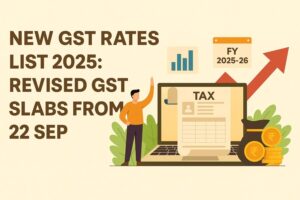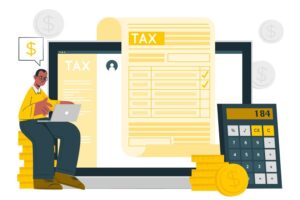GST on Flat Purchases in 2024 and Its Impact on Home Buyers
- 18 Dec 24
- 10 mins
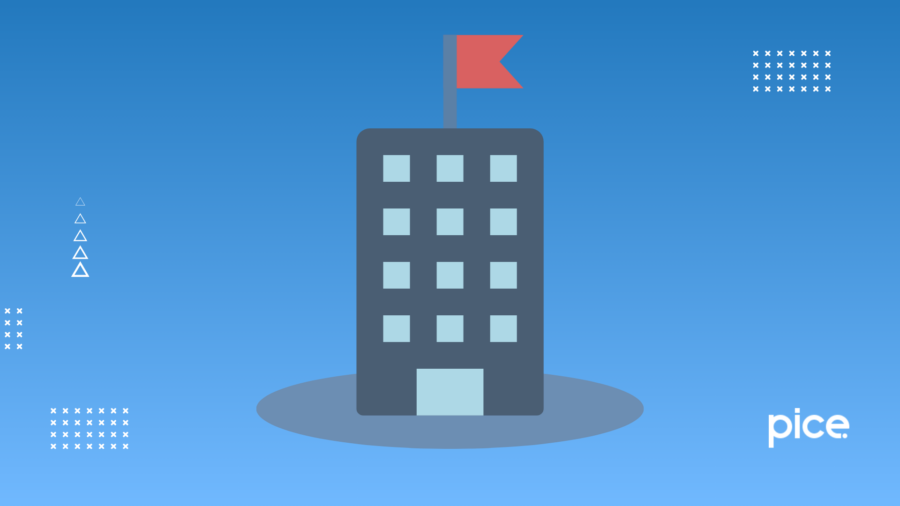
GST on Flat Purchases in 2024 and Its Impact on Home Buyers
- What Is the GST on Property in India?
- GST on the Purchase of a Flat
- Taxes Before the Introduction of the GST
- Types of State and Central Taxes That the GST Absorbed
- What Does GST's Input Tax Credit (ITC) Entail?
- Conditions Governing GST on Residential Real Estate Market
- Additional Conditions to Receive 1% GST on Flat Purchases
- Calculation of GST on the Purchase of a Flat in India
- Calculation of GST on Affordable Housing Before and After GST Revision
- Effect of GST on the Purchase of Luxury Homes
- Benefits of Paying GST on Flat Purchase
- Impact of GST on Home Buyers
- Impact of GST on Home Loan
- Conclusion
Key Takeaways
- No GST on ready-to-move-in flats; applicable only on under-construction properties.
- GST rates: 1% for affordable housing and 5% for non-affordable housing without ITC.
- Affordable housing includes properties priced up to ₹45 lakh and defined size limits.
- GST ensures simplified, transparent, and standardized property taxation.
- Under-construction GST impacts home loan costs and repayment planning.
GST on flat purchases varies based on the type of property. For instance, you have to pay GST (and no other indirect taxes) on the property cost of under-construction flats. However, you do not have to pay GST on the cost of a ready-to-move-in property.
The GST rates furthermore vary for affordable and non-affordable housing units. Learn elaborately about the applicable GST for properties and its impact here.
What Is the GST on Property in India?
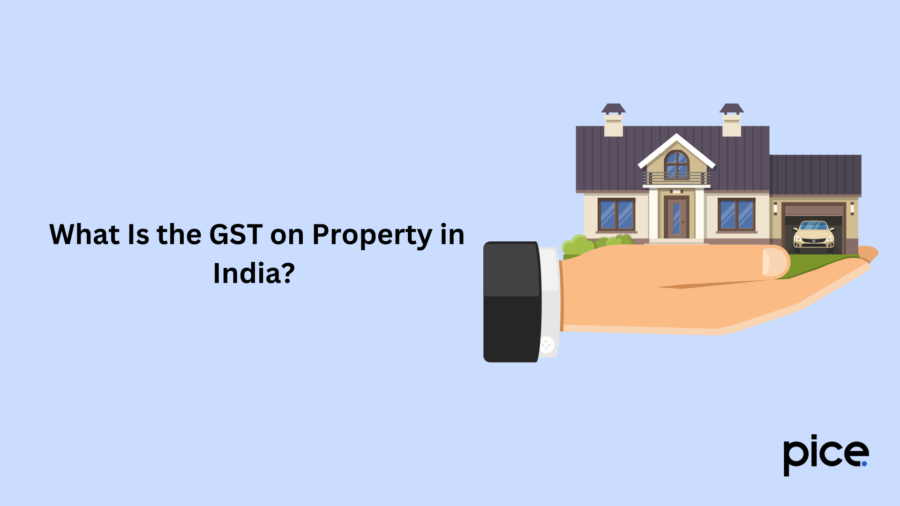
The Central Government of India introduced the Goods and Services Tax (GST) in 2017 to simplify the taxation system in the country. Prior to GST implementation, the taxation structure was complicated and less transparent.
Property purchasers and developers had to pay multiple taxes like value-added tax, service tax and central excise. This increased the tax burden on property purchasers. Under the GST regime, property tax has been simplified.
The GST on property acquisition for non-affordable housing societies was 12% initially and for affordable housing projects for premium residential property purchases was 8%. However, after the revision of GST rates during the 33rd meeting of the GST council, the revised rate for purchasing non-affordable or luxury housing units is 5% and affordable housing is 1%. The rates have been effective since 1st April 2019.
GST on the Purchase of a Flat
If you purchase flats and apartments in under-construction developments or ongoing projects in Indian megacities in 2024, you will have to pay GST. However, finished projects receive a certificate of completion from appropriate authorities. As a result, you do not have to pay GST to buy finished apartments.
Here are the applicable GST rates on flat purchases in 2024:
| Residential Property Types | GST Rate Till March 2019 | GST Rate April 2019 Onwards |
| Affordable housing under construction | 8% with ITC | 1% without ITC |
| Non-affordable housing other than under-construction | 12% with ITC | 5% without ITC |
| Ready to move in properties | No GST applicable | No GST applicable |
Taxes Before the Introduction of the GST
Various taxes were applicable for housing project developers prior to the introduction of GST in 2017. This increased the cost of construction project development. In addition, developers were ineligible for credit against the taxes paid and the output liability. Here are the taxes that developers had to pay before the implementation of GST:
- Value Added Tax (VAT)
- Service Tax
- Entry Tax
- Central Excise
- Octroi
- LBT
Further, the prevalence of multiple taxation resulted in complications and tax evasion by several project developers. To eliminate such complexities, the Indian Government introduced GST in 2017.
Types of State and Central Taxes That the GST Absorbed
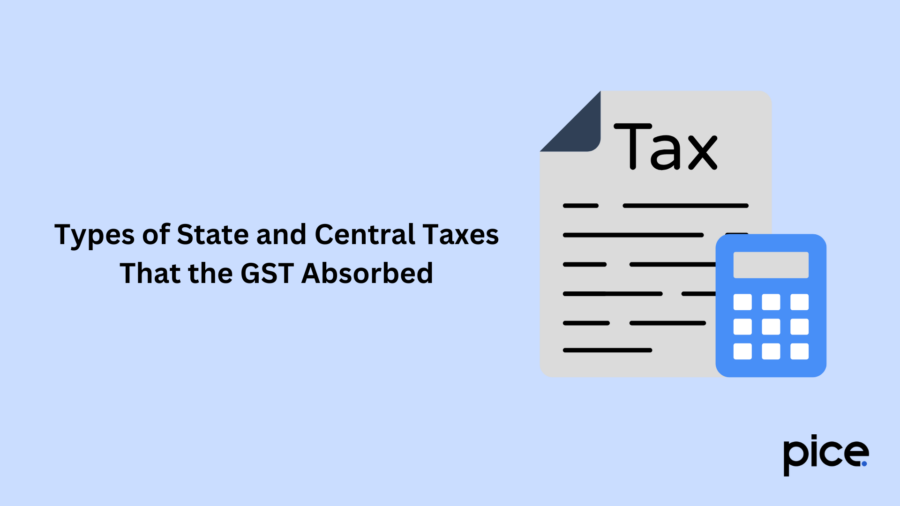
The following are the taxes that GST replaces:
Central Taxes
Here is the list of central taxes:
- Service tax
- Central sales tax
- Central surcharge and cess on supply of goods and services
- Customs duty
- Special additional duty of customs
- Excise duty
State Taxes
Here is the list of state taxes:
- State value-added tax
- Purchase tax
- Entertainment tax
- Luxury tax
- Taxes on lotteries, gambling and betting
- Taxes on advertisement
- State excise duty
- State surcharge and cess on supply of goods and services
What Does GST's Input Tax Credit (ITC) Entail?
The GST system entails a facility for input tax credit (ITC). Real estate developers have to pay multiple taxes to acquire goods and services during housing project construction. The GST regulations allow builders to receive input tax credits under GST when he/she pays output tax. This reduces the builder's output tax liability.
For instance, suppose a property builder has to pay ₹30,000 tax on his finished products. However, while purchasing materials like cement, steel, paint and others, he/she paid ₹25,000 in input tax. Thus, after adjustments, the builder will have to pay only ₹5,000 as output tax in this scenario.
However, this exemption primarily applies to rental or commercial properties and does not include residential properties for personal use.
Conditions Governing GST on Residential Real Estate Market
Here are the prerequisites that can help you qualify for a 1% GST exemption on residential property:
| A property in a metro city will fall under affordable housing if | The area of the house under construction is 60 square metres with a price of up to ₹45 lakh |
| A property in a non-metro city will fall under affordable housing if | The area of the house under construction is 90 square metres with a price of up to ₹45 lakh |
Additional Conditions to Receive 1% GST on Flat Purchases
You can be eligible for a 1% GST rate on flats if you purchase at least 80% of the raw materials from a registered dealer. Alternatively, the dealer has to pay an 18% GST on the reverse charge mechanism (RCM).
Notably, the 1% GST payable for affordable housing under development excludes ITC. As a result, you cannot deduct the GST from your income while acquiring the property. Similarly, you will have to pay the same income tax annually on your income and not a decreased yearly income tax.
Calculation of GST on the Purchase of a Flat in India
The GST for affordable housing is relatively less than the GST for non-affordable housing. Here is how to calculate GST on affordable and non-affordable property:
Calculating GST on Affordable Property
You can follow the process mentioned below to calculate GST on affordable housing:
| The cost of property per square feet | ₹6,000 |
| GST on the affordable housing segment | 1% |
| GST value per square feet | ₹60 |
| Price per square feet after GST application | ₹6060 |
Calculating GST on Non-affordable Property
Use the following method to calculate GST on non-affordable property:
| Cost of property per square feet | ₹10,000 |
| GST on the non-affordable housing segment | 5% |
| GST value per square feet | ₹500 |
| Price per square feet after GST application | ₹10,500 |
Calculation of GST on Affordable Housing Before and After GST Revision
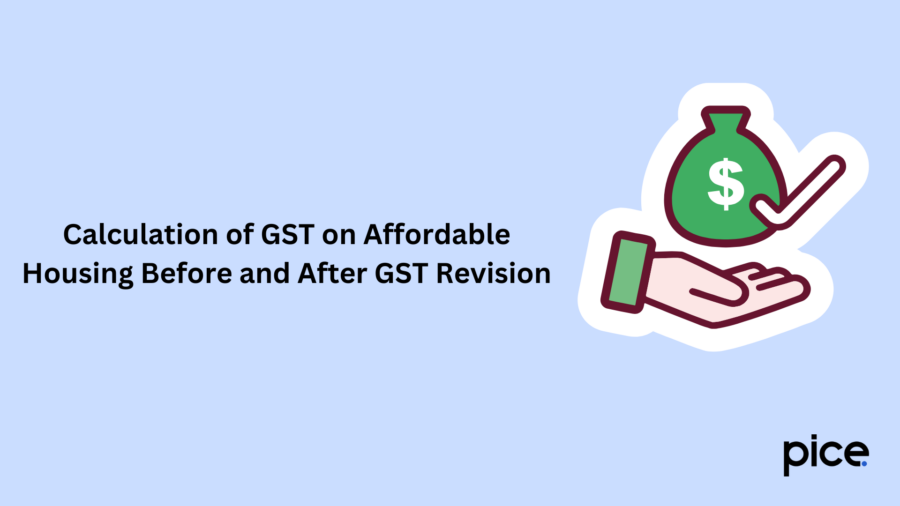
Here is how GST on affordable housing is calculated before and after April 1st 2019:
| Affordable Housing | GST on Affordable Housing Before April 1st 2019 | GST on Affordable Housing After April 1st 2019 |
| Cost of property per square feet | ₹3,500 | ₹3,500 |
| GST rate on flat purchase | 8% | 1% |
| GST | ₹280 | ₹35 |
| ITC benefit for a material cost of ₹1,500 at 18% | ₹270 | Not applicable |
| Total | ₹3,510 | ₹3,535 |
Effect of GST on the Purchase of Luxury Homes
Purchasers of luxury homes can save more after the new GST rate implementation. Here is the process to calculate GST on luxury house purchases:
| Luxury Homes Segment | Before April 1st 2019 | After April 1st 2019 |
| Cost of property per square feet | ₹7,000 | ₹7,000 |
| GST rate on purchase of flat | 12% | 5% |
| GST | ₹840 | ₹350 |
| ITC benefit for a material cost of 13,000 at an average of 15% | ₹126 | Not applicable |
| Total | ₹7,714 | ₹7,350 |
Benefits of Paying GST on Flat Purchase
Here are the benefits of paying GST on flat purchases:
- Transparency: You can ensure transparency in your property transaction process by paying GST.
- Standardisation: As GST is a uniform tax, a standardised tax rate prevails across the country.
- Reduced Tax Burden: GST has effectively replaced multiple taxes such as VAT, service tax and others. This has reduced the tax burden on property buyers.
Impact of GST on Home Buyers
Here is how GST impacts home buyers:
- Cost of Property
Under-construction properties attract GST. As a result, property buyers need to consider the additional cost of GST while budgeting their property purchases.
- Financial Planning
If you are planning to buy a home, ensure you consider the GST component. This component increases your loan amount and your equated monthly instalments (EMI).
- Choice of Property Type
Ready-to-move-in properties do not attract GST. Thus, property buyers can choose to buy a ready-to-move-in property to avoid paying GST. However, stamp duty and registration fees remain separate and are not covered under GST.
- Developer Compliance
Developers need to collect and remit GST to the government. If you are buying a property, ensure that your chosen developer is GST-compliant to avoid legal or financial implications.
- Transaction Transparency
You can improve your real estate sector transaction transparency if you adhere to GST laws. It helps you know the total cost of purchasing a property.
- GST Rates and Calculations
As a property purchaser, be aware of the GST rates and calculations. You need to consider the type of property, availability of input tax credit (ITC) and construction status.
- Potential Savings Through ITC
As under-construction properties attract GST, it is crucial for buyers to understand ITC. Appropriate documentation such as tax invoices can help you claim ITC reducing your tax burden.
- Government Policies and Regulations
Government policies and regulations are subject to change affecting the GST rules and rates. You need to be aware of the updated policies and regulations for accurate financial planning.
- Professional Guidance
You can seek the guidance of professionals to know and understand GST regulations effectively. Professionals will likely guide through complexities for individual property transactions.
Impact of GST on Home Loan
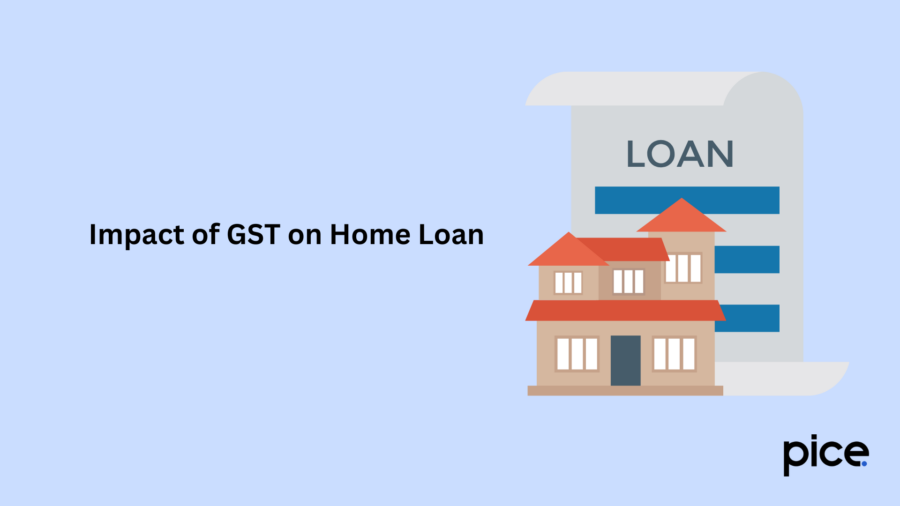
Here is the impact of GST on Home Loan:
- Impact on Loan Amount
In the case of under-construction properties attracting GST, the overall property cost and processing fees might increase after the GST application. Consequently, property buyers might need to borrow a higher loan amount. This further increases the equated monthly instalments (EMI) on your home loan.
- Impact on Loan Repayment Period
As the total property cost increases with GST, home buyers might have to consider a longer repayment period. However, based on their financial capacity, home buyers can adjust the loan repayment tenure.
- Interest on GST Amount
The GST imposed on an under-construction property cost might be treated as a part of the overall loan value. In such a case, it attracts additional interest over the loan tenure.
Conclusion
The rate of GST on flat purchases has been revised with effect from April 1st 2019. It effectively reduced the GST rate from 12% to 5% for luxury property purchases. As a result, property buyers buying luxury flats can reap the benefits of higher savings with a reduced GST rate.
Nevertheless, the GST implications for affordable and non-affordable properties differ from luxury properties. Ensure you adhere to the applicable tax rates to comply with the GST laws. In addition, one must also note that GST and tax structure for land purchases differ from that of property purchases.
💡If you want to streamline your payment and make GST payments, consider using the PICE App. Explore the PICE App today and take your business to new heights.
 By
By 









